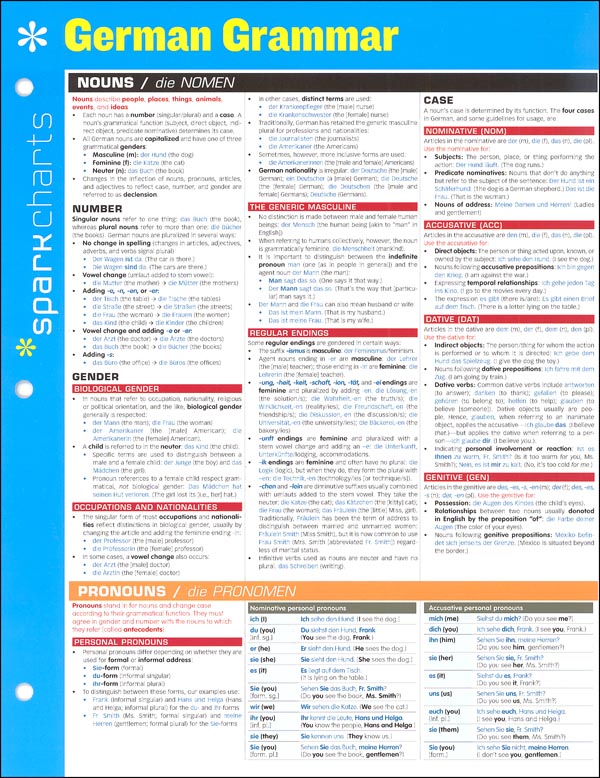

Gramática alemana - declinaciones, preposiciones, verbos, conjugación verbal von José Antonio Molina.' Gramática alemana' de Justo Fernández López.Unversity of Michigan provides examples and explanations of German grammar.Internet Handbook of German Grammar is the comprehensive reference for German grammar from.' German Language Course for English Speaking Students.German Verb Conjugation: verb tables show the German as written after 1996 spelling reform, a service of.Additionally there is a ' Grammatikführer' (grammar guide) and a ' Grammatik Glossar' available. German for Beginners in 5 lessons from Hyde Flippo of.Similar sources in Spanish language are available below is a portal for the German language with more than 800 pages of grammar, 3.000 sound examples, more than 2.500 exercises, voice chat and forum.Helpful Online Grammar Resources for learning German from.Guide to the " German Resources on the Web" of the American Association of Teachers of German (AATG).In the above examples, the words "vielleicht" and "und" are particles and their position in the sentence is not one but zero.Įine Katze ist kein Hund und ein Zebra ist kein Pferd.Ī cat is not a dog and a zebra is not a horse.Įin Ei ist kein Ball aber der Thunfisch ist ein Fisch.Īn egg is not a ball but the tuna is a fish.| explanations about German grammar | grammar exercises online | The object is still the first element and verb is the second element. In other words, if the particle is placed before the object then the particle position is zero. Sometimes a particle is placed before the object, but it doesn't change the position numbers of elements, because the particles occupy no position. The following is the video summary of the topic compound nouns. To learn more about traffic system in Germany, please visit /drivingingermany.

Or in case of "Sozialgeld" it would be "das Sozialgeld" (social money)īecause the last word in the combination is "das Geld" (money).ĭer Zebrastreifen (cross-walk / zebra crossing)ĭie Tiefgarage (underground parking lot ) In the case of "Sozialarbeiterin" it would be "die Sozialarbeiterin" , In this chapter, it is just a hint that you should be ready for what's coming next.Ī combination can also be formed by joining an article and a noun, as in the above example, "der Sozialarbeiter". Certain prepositions also cause declination of the article and we shall discuss in the coming lessons how articles decline with certain cases and prepositions. This is the declination of the original article "die" into "der" due to the preposition "an", (which means at in English). Medizinuniversität (medical university) is still a feminine noun, even with the article "der". Frau Doktor Lisa Müller ist auch Professorin an der Medizinuniversität. Is the combination of two nouns, "die Medizin"Īnd gets its article "die" from the last noun, "die Universität".īut just recently we have learned a sentence where the noun Universität is using the article "der". As in the above example, "der Zahnarzt" (dentist) gets its article from the last word in the combination, i.e. In the above example "der Zahn"Īre two separate nouns, and they combine to form a single noun "der Zahnarzt".Ī noun formed by the combination of two nouns extracts its article from the last noun in the combination. Joining two nouns to form a single noun is a common practice among many European languages, including German. In German, the definite article is called der bestimmte Artikel.Īs discussed in the previous lesson, German nouns have three types of genders.Ĭontrary to the English language, where the single definite article "the" is used for both genders, German has different forms of definite article for each of its three genders.įor masculine nouns, for example, der Mann (the man),įor feminine nouns, for example, die Frau (the woman),įor neuter nouns, for example, das Messer (the knife). We shall discuss other cases and declension in coming lessons step by step. This lesson is about basic forms of German articles without declensions i.e. In German, both definite and indefinite articles decline according to the respective grammatical case.

Grammatical cases play a very important role in the German language.


 0 kommentar(er)
0 kommentar(er)
